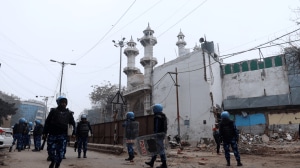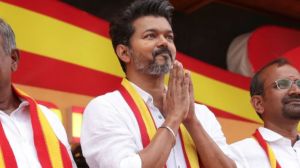Eelam is no Bangladesh
IT'S the ultimate paradox. Even as the government gets ready for a serious dialogue with the Hurriyat leaders in Kashmir up north, down so...

IT8217;S the ultimate paradox. Even as the government gets ready for a serious dialogue with the Hurriyat leaders in Kashmir up north, down south Sri Lanka erupts in our face.
The stakes for India are very high. A Tamil Eelam is no Bangladesh. The reason is simple: the LTTE is no Mukti Bahini, even though the Tigers were propped up by the Indian government in the early years.
An LTTE victory the fall of Jaffna itself will give the LTTE a tremendous psychological advantage will encourage insurgencies led by the Nagas and Bodos in the North-East, the People8217;s War Group in Andhra Pradesh, and fringe groups in Punjab and Jamp;K. The LTTE has been known to have connections with these groups, helping them with money and arms. In fact, they have a common interest in buying arms from Bangladesh and Thailand.
There is also no certainty that the LTTE, if it emerges victorious, will not try and extend its area of influence to Tamil Nadu and fuel an insurgency in southern India. It eliminated Rajiv Gandhi. It has a record of annihilating Tamil leaders who have disagreed with it. The politics of Tamil Nadu may have its share of confrontation but it has not led to bloodshed.
The Tamils of Sri Lanka were at no point a part of Tamil Nadu and what is interesting is that there are no Brahmins among them. The Indian Tamils have not felt the urge to go and fight for the cause of a Tamil Eelam and the Rajiv Gandhi8217;s assassination has only added to the distinct abatement of sympathy towards the LTTE.
But mass sympathy is not a necessary prerequisite for Prabhakaran to fish in troubled waters. Prabhakaran has always exploited the internal politics of Tamil Nadu and will continue to do so. In the early years the DMK, which is considered sympathetic to the LTTE, used to back the TELO Tamil Eelam Liberation Organisation. It was TELO which represented the Tamil cause at the Thimpu Conference in 1986. It was M.G. Ramachandran who was close to Prabhakaran and propped him up. MGR, who liaised between Indira Gandhi and the LTTE chief, was the one who persuaded Prabhakaran to accept the Rajiv-Jayewardene accord to begin with. Later Prabhakaran went back on it.
Today Karunanidhi calls the shots in the Union government, but there was a time when the DMK was for an independent Dravidstan. Since then, one or the other dravidian party has ruled Tamil Nadu and this has ceased to be an issue. The Congress has not come to power in Tamil Nadu since 1967, ever since the state was rocked by anti-Hindi riots. Today people did not react when the Hi-gh Court struck do-wn the government order making Tamil the compulsory me-dium of instruction till Class Five because even a peon would like his son to be proficient in En-glish. But competitive politics has its own logic and has created many a Bhindranwale. The existence of an Eelam could make Prabhakaran an alternate pole for the people of Tamil Nadu.
Today, a Vaiko espousing the cause of a Tamil Eelam makes Karunanidhi nervous. Even though the likes of Karu-nanidhi would be the first targets of a victorious Prabhakaran, the DMK chief to- ed the Vaiko line and stated that an Eelam would make the DMK happy. Bal Thackeray, and some others in the BJP, may allow themselves to be persuaded that a Tamil Ealam would be good for India because it would be a Hindu nation. By that logic, all Muslims countries sho-uld be friends to each other, but this is not the case. Religion can, at best, be a cultural bond not a political one.
The government8217;s offer to mediate between the Sri Lankan government and the LTTE, provided both sides ask for its help, is a double-edged sword, even though for the moment it helps the government take some kind of a position on a sticky wicket. Tomorrow the world community can legitimately turn around and tell India that if it can offer to mediate in Sri Lanka, surely it can accept the offer of mediation in Kashmir.
In other words, India is confronted with a classic Catch-22 situation. A Tamil Eelam is not in India8217;s interest. But the imperatives of coalitional politics are dictating foreign policy. The PM, who is dependent on the DMK, MDMK and PMK for support, declared that India would not intervene even if Jaffna fell. It was curious that he should make that statement.
It seems that the Prime Minister, worried about the implications of Sri Lanka for his government, is allowing himself to be led by the Tamil parties rather than leading them. The Government shows no signs of formulating a strategy where a distinction is made between the cause of the Tamils, who must have their rights ensured in a federal arrangement in Sri Lanka, and the terrorist politics of the LTTE, which no government can support.
It is this the Vajpayee government has to come to grips with, even as it lobbies for international pressure to get the LTTE to the negotiating table and accept a devolution package within the framework of Sri Lankan integrity.
- 01
- 02
- 03
- 04
- 05































